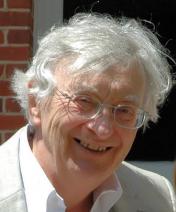This article may rely excessively on sources too closely associated with the subject, potentially preventing the article from being verifiable and neutral. (March 2022) |
Lindon Eaves | |
|---|---|
 | |
| Born | 23 September 1944 Walsall, Staffordshire, England |
| Died | 8 March 2022 (aged 77)} Richmond, Virginia, U.S. |
| Nationality | British, American |
| Alma mater | University of Birmingham, Ripon College Cuddesdon, Oxford University |
| Known for | Development of field of behavioral genetics, statistical modeling, genetical theory, genetics of personality and social attitudes |
| Scientific career | |
| Fields | Behavioural genetics |
| Institutions | Virginia Commonwealth University, University of Birmingham, Oxford University |
| Doctoral advisor | John L. Jinks |
| Doctoral students | Andrew C. Heath, Nick Martin |
Lindon J. Eaves (1944–2022) was a behavior geneticist and priest who published on topics as diverse as the heritability of religion and psychopathology. His research encompassed the development of mathematical models reflecting competing theories of the causes and familial transmission of human human differences, the design of studies for the resolution, analytical methods for parameter estimation and hypothesis-testing and application to substantive questions about specific (human) traits.[1] He was the first to consider standardized variance components for heritability estimates[2][3] and was the first (at least in the human context) to consider the effects of living with a relative (with a different genotype or, in the case of monozygotic twins, the same genotype) on the behavior of a person.[4] Furthermore, he was the first to think about genotype x age interaction[5] and set up the algebra to study the effects of genes working in males as well as females, making it possible to use twins pairs of opposite-sex (dizygotic opposite sex).[6] Together with Nick Martin, he wrote many classic papers, one of which is "The genetic analysis of covariance structure".[7] They also wrote the book, Genes, culture and personality: An empirical approach. In 2012, a Festschrift was held in Edinburgh dedicated to Eaves' work; the proceedings were subsequently published in Behavior Genetics.[8]
He was ordained a deacon in 1968, and a priest in 1969 by the Bishop of Birmingham, Church of England. He served in the Church of England until 1981 and several churches in Richmond, Virginia including Church of the Holy Comforter, 1986–1997; St. James's, 1997; and St. Thomas, 2002–2013 as a priest in residence.
- ^ Eaves, LJ; Gale, JS (1974). "A method for analyzing the genetic basis of covariation". Behav Genet. 4 (3): 253–267. doi:10.1007/bf01074158. PMID 4471972. S2CID 11113675.
- ^ Eaves, LJ (1969). "The genetic analysis of continuous variation: A comparison of experimental designs applicable to human data". British Journal of Mathematical and Statistical Psychology. 22 (2): 131–147. doi:10.1111/j.2044-8317.1969.tb00426.x.
- ^ Eaves, LJ (1970). "The genetic analysis of continuous variation: A comparison of experimental designs applicable to human data. 11. Estimation of heritability and comparison of environmental components". British Journal of Mathematical and Statistical Psychology. 23 (2): 189–198. doi:10.1111/j.2044-8317.1970.tb00443.x.
- ^ Eaves, LJ (1976). "A model for sibling effects in man". Heredity. 36 (2): 205–214. doi:10.1038/hdy.1976.25. PMID 1063734.
- ^ Eaves, LJ; Eysenck, H (1976). "Genotype X age interaction for neuroticism". Behav Genet. 6 (3): 359–362. doi:10.1007/bf01065731. PMID 987784. S2CID 31336084.
- ^ Eaves, LJ (1977). "Inferring the causes of human variation (with discussion)". J R Stat Soc Ser A. 140 (3): 324–355. doi:10.2307/2344924. JSTOR 2344924. S2CID 149746733.
- ^ Martin, NG; Eaves, LJ (1977). "The genetical analysis of covariance structure". Heredity. 38 (1): 79–95. doi:10.1038/hdy.1977.9. PMID 268313.
- ^ "Special Issue: A Festschrift for Lindon J. Eaves". Behavior Genetics. 44 (3). May 2014. Retrieved 2014-05-26.